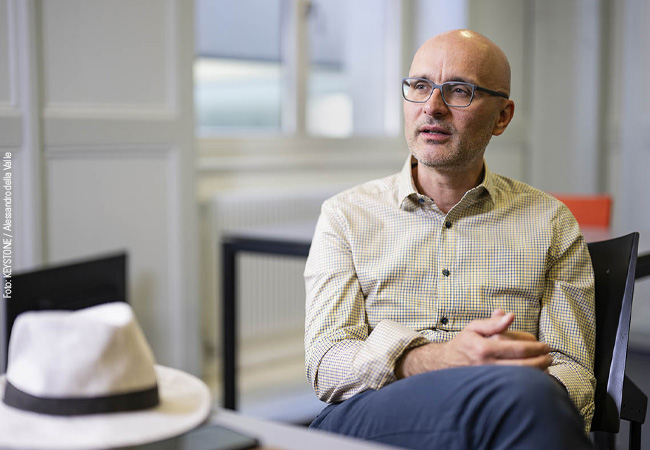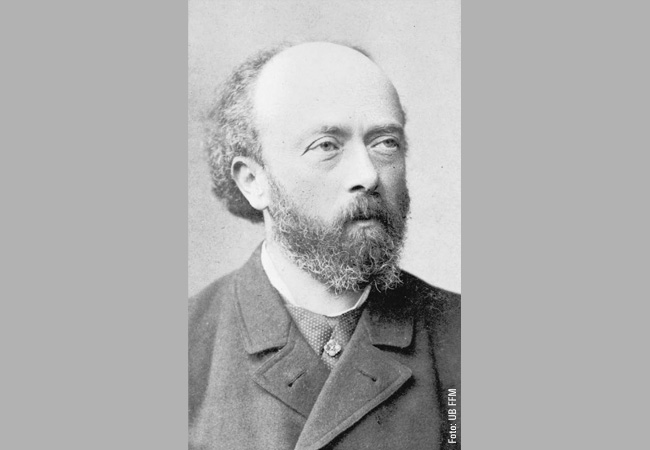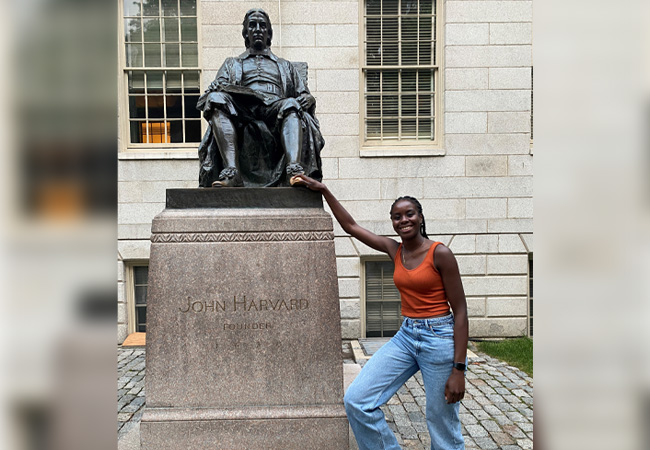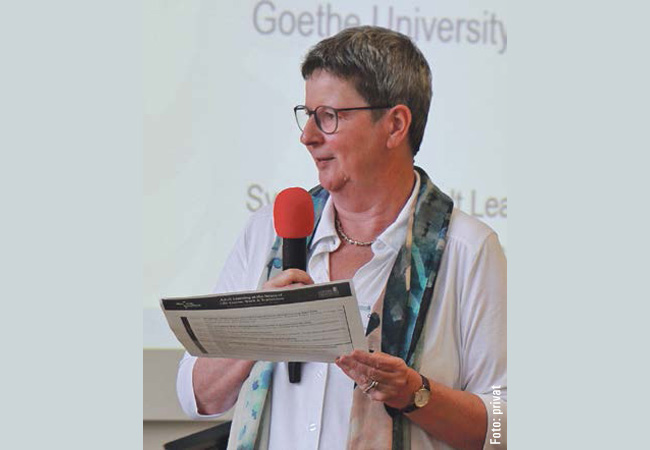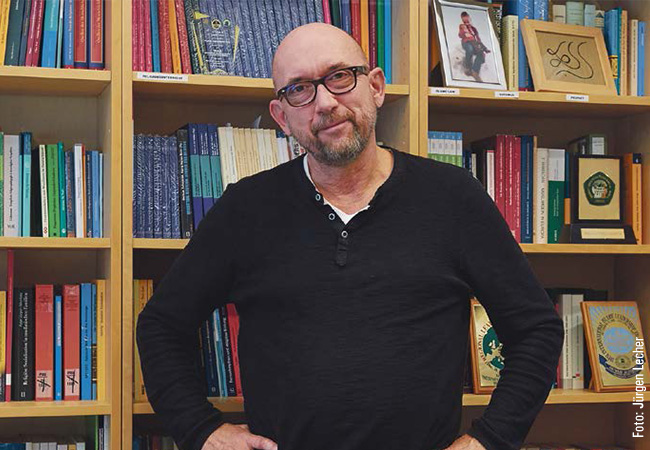Prof. Samir Mitragotri is this year’s Friedrich Merz Guest Professor
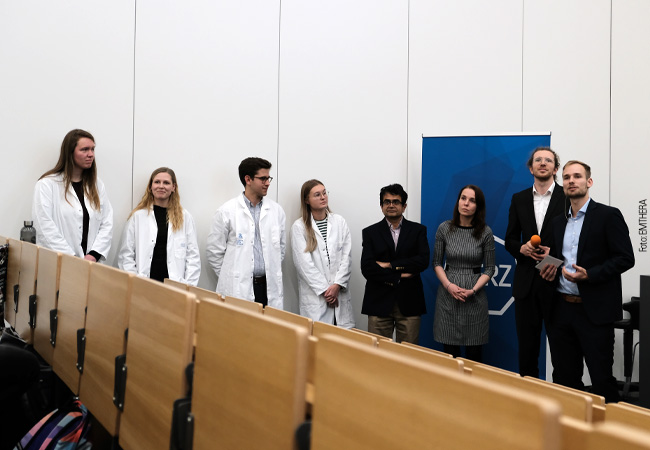

Have you ever wondered what it would be like if, sometime in the future, medicines could travel like personalized messengers to specific targets in our bodies to fight diseases? This fascinating vision was the focus of the “Citizens’ Symposium” associated with the Friedrich Merz Guest Professorship. The event, held on November 7, 2023, offered an opportunity to students and researchers, but more particularly to Frankfurt’s citizens, to enter into a dialog with renowned scientists. A large audience of over 130 participants, aged from four to 86, filled the auditorium on Goethe University’s Riedberg Campus and attentively followed the two-hour lecture program.
This year’s guest professor was Samir Mitragotri, Hiller Professor of Bioengineering and Hansjorg Wyss Professor of Biologically Inspired Engineering at Harvard University in Cambridge (USA). His research focuses on innovative drug delivery approaches – specifically on developing carrier systems that enable the safe and precise distribution of medicines in the human body. Opening the event was Prof. Maike Windbergs, scientific curator of this year’s guest professorship, who explained the concept to the citizen audience using an everyday example: “To ensure that parcels, especially those with fragile contents, reach their recipients undamaged, we need a certain packaging material – a soft padding –, the recipients’ exact addresses, and a reliable tracking system” – outlining a process many are all too familiar with.
EMTHERA
“It’s pointless to develop new treatments if they aren’t accepted and used by society. The experiences we made during the most recent pandemic confirm this. I therefore have a special interest in communicating scientific findings and promoting dialog between science and society. Events like the Citizens’ Symposium play a decisive role, by building bridges between research and the general public,” Prof. Windbergs said in the wake of the Citizens’ Symposium. These perspectives also play a role in the research cluster EMTHERA (EMerging THERApeutic strategies), on whose Steering Committee Prof. Windbergs serves alongside seven other scientists from Goethe University Frankfurt and Johannes Gutenberg University Mainz.’
Using the most advanced RNA and proximity-inducing technologies and in close cooperation among the partners, the research cluster initiative strives to develop new therapeutic strategies for the treatment of infections caused by RNA viruses and multi-resistant bacteria, the reduction of inflammation and improved tissue repair. Two members of the Rhine-Main Universities Alliance (RMU) are combining their complementary expertise in the initiative to apply an interdisciplinary approach to highly relevant questions in the field of new therapeutic strategies.
Link: EMTHERA
The Citizens’ Symposium is a firm fixture in the one-week event associated with the guest professorship. This year’s symposium began with insights into Prof. Mitragotri’s high-caliber research. To ensure his lecture would be understood by the audience, Prof. Windbergs acted as translator, giving all participants the chance to acquire fascinating insights into future treatment options. Prof. Mitragotri uses cells from the human body to transport the drugs to their target point in the patient. Red blood cells act as shuttles, transporting drug-infused nanoparticles into specific tissues – almost as if the medicines were hitch-hiking around the circulation. The blood cells carry the nanoparticles unhindered through the patient’s body to, say, the lung, where they then discharge their loads at exactly the right place, releasing the drug. Using an equally vivid comparison, Prof. Mitragotri reported of his work sending immune cells carrying “backpacks” of anti-inflammatory drugs directly to their target. These visionary strategies could in future be used to persuade the body’s own cells to heal inflamed tissue or to fight cancer tumors.
When asked why she decided to invite Prof. Mitragotri, Prof. Windbergs replied: “Effective treatments not only require the development of new active ingredients. What’s equally and maybe more important is their targeted transport within the body. Many people are not aware of this, which is why it is important to us to promote this understanding. The decision to invite Prof. Mitragotri is based on his pioneering work in the field of drug delivery systems, a topic that is vital for the future development of medication.” As director of Goethe University’s Institute for Pharmaceutical Technology, Prof. Windbergs is extremely familiar with this principle. As part of her research, she and her multidisciplinary team develop new forms of treatment in the fields of infection, inflammation and wound healing.
Later in the evening, doctoral students from the Institute for Pharmaceutical Technology took over the symposium’s program, entertaining the citizen audience with a varied moderation and short talks that vividly illustrated the complex topics so the audience could grasp the science involved. Using Lego bricks, Christopher Hauss explained basic scientific principles, illustrating the development of the classical pastille into a pharmaceutical high-tech product. Annika Hässler delivered a visually stunning presentation showing how nanoparticles – “tiny particles with a huge impact” – enable the targeted transport of drugs into various organs or tumors. Alexandra Hübl explained how innovations in pharmaceutical technology prevent the (un)intentional abuse of medicines, thereby making medicines safer. Finally, Annika Horchler took the audience on a journey from the laboratory to the nursery and reported how medication for the youngest patients is being made not only safer, but also tastier.
For some of the doctoral students it was their first time delivering a lecture to an audience of non-scientists. “It was challenging, but also extremely exciting to explain complex topics to a wider public.” The discussions that followed the scientific program proved that they managed to arouse the interest of Frankfurt’s citizens. Participants used the opportunity to mingle, and for a long time after the lectures had ended remained steeped in discussion in a relaxed atmosphere while enjoying “apple wine” and snacks, asking questions and exchanging thoughts and ideas. For one evening, they made science a topic that is relevant not only for experts but for everyone. “Communicating science doesn’t often feature in our day-to-day work as researchers, even if it can be so simple and fulfilling to talk with friends or family about these topics,” one of the participants said. The Friedrich Merz Guest Professorship and the associated citizens’ dialog showed once again just how important it is to take science out of the labs and into society. A dialog that does more than just expand horizons, it also deepens the understanding of the potentials of future medication.
Nathalie Jung, Institute for Pharmaceutical Technology
ExStra – The Excellence Strategy of the German Federal and State Governments‘
Goethe University Frankfurt is applying for the upcoming round of the Excellence Strategy of the German federal and state governments with four new clusters on the following research topics: Trust in conflict (ConTrust), infection and inflammation (EMTHERA), the origin of heavy chemical elements (ELEMENTS), and cellular architectures (SCALE). These applications bring together the competencies and pioneering ideas of Goethe University Frankfurt with those of colleagues in the Rhine-Main Universities (RMU) alliance and additional partners from four major non-university research organizations. The Cluster of Excellence “Cardio-Pulmonary Institute” (CPI), first set up in 2019, will submit a full proposal next year.


